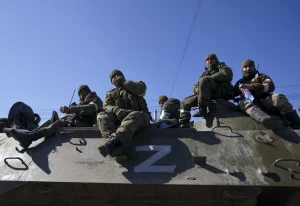
Venice Film Festival features propaganda film Russians at War, shot in occupied Ukraine
The Venice Film Festival's non-competition lineup continues with the screening of the documentary Russians at War by Anastasia Trofimova, who aims to portray Russian soldiers not as "beasts," but as "ordinary people"
The Venice Film Festival website reported the information.
On September 5, the out-of-competition program of the 81st Venice International Film Festival screened a propaganda film by Russian-Canadian director Anastasia Trofimova, Russians at War. The film, co-produced by Canada and France, according to the description, tells the stories of Russian soldiers that will provide "a deeper understanding" of the war. Three screenings will also take place on September 6, and later the film will be shown at the Toronto International Film Festival.
The Russian director, who emigrated to Canada, joined a battalion of the Russian army in Ukraine. Trofimova "earns the trust of foot soldiers and embeds herself over the span of a year with one battalion as it makes its way across Eastern Ukraine.”
“What she discovers is far from the propaganda and labels pushed by the East or the West: an army in disarray, soldiers disillusioned and often struggling to understand what they are fighting for,” the film festival's official website says.
Trofimova says that she focused her attention "on those most of the world had not seen before—Russian soldiers.”
“My hope is that their stories add to a deeper understanding of this senseless and traumatic war,” she emphasized.
In an interview with the Russian propaganda outlet People of Lake Baikal, Trofimova explains why she decided to make the film.
"In the Russian media, soldiers are heroes, faceless mannequins. In the Western media, they are all rapists and murderers. But how can you describe a person without ever talking to them?" the director clarified.
Trofimova said that Russians at War is not a historical analysis of the causes of the war, but "a real testimony of a previously invisible side." She refers to the "invisible side" as Russian soldiers. Most of the film was shot in the occupied Luhansk and Donetsk regions. Trofimova's goal is to show the world that Russian soldiers are not beasts, as they are portrayed by Ukrainian and Western media, but "ordinary people in an extraordinary situation.”
"I didn't know what to expect from the Russian military. And I was most impressed by the fact that they are ordinary people. Absolutely ordinary people in an absolutely extraordinary situation. I was surprised that we could argue about some political issues - whether the Russians are committing war crimes, for example," she said in an interview with the Russian outlet.
She also expressed admiration that the Russian criminal army "remains human.”
"I was amazed at how much they endure what is happening to them. Physical deprivation, despair, and death are all around. But despite this, people are trying to hold on and remain human," Trofimova said.
The director, whose film is being promoted at a prestigious international film festival, admitted that she had not seen 20 Days in Mariupol because she "didn't have time," but that it broadcasts propaganda narratives about protecting Donbas residents.
"Ukrainians from Donbas who are fighting in the ranks of the Russian army have a very clear, motivated position. Much more so than the Russians. That I am defending my home, my home was bombed, so many of my relatives or friends were killed. And Russians have a different vision. There are guys who go to war because the country calls them. That's it, nothing else matters. There are those who believe that they came to defend Russia from NATO expansion. There are those who don't quite understand what they are doing there and how right it is, and there are many mobilized people," she emphasized.
Trofimova said that she was for peace, and people who support either side were for war. She decided to show the Russian military as human beings, because this is the only way to end the war.
"Journalists are usually accused of humanizing Russians. But I don't really understand what needs to be humanized. So that the 'Radio of the Thousand Hills' (a radio station whose hosts called for the genocide of Rwandans in the 1990s) can happen again? All this leads to an ongoing war and even worse consequences. It seems to me that you cannot choose a side now. If you choose a side, you are for war. You are for war either on this side or on that side. And I am for peace. And I would like us to see each other as people," the director added.
- News











































